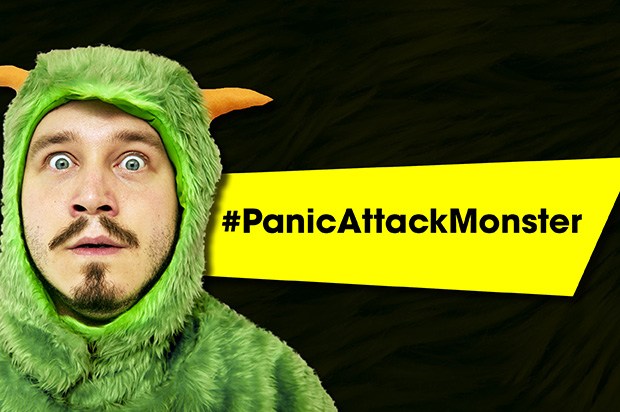How to help someone having a panic attack

Whether it’s your mate or your mum, panic attacks can be scary to watch. Here’s how to help someone having a panic attack while keeping yourself calm.
How do I know if someone’s having a panic attack?
If you’re witnessing a panic attack for the first time, whether it’s a friend, family member or a stranger, it can be quite scary. Panic attacks can sometimes be slightly difficult to spot too, as they’re completely dependent on the individual. Some common signs that a person is having a panic attack include physical symptoms like:
- Excessive sweating
- Rapid breathing and shortness of breath (also known as hyperventilating)
- Trembling
- Nausea, or feeling sick
- A choking feeling
- Dizziness
When you spot the signs of a panic attack, the person might need your help to keep them safe whilst they’re calming down. Alternatively, they might ask you to give them some space. It’s okay to leave them to come out of their panic attack if they’re not in any danger – just stick close by and let them know you’ll be back if they need you.
The Mix also has more information about panic attacks, including their causes, warning signs and triggers.
What to do when someone is having a panic attack
Before helping any person having a panic attack, it’s important that you try to stay as calm as possible so that you’re able to think straight – sometimes your panicking could make their symptoms even worse. If you’re in a calm enough state, here are our top tips for how to help someone having a panic attack.
1. Try talking to them gently
Let them know that you’re there for them, and that they’re safe. They might not answer you, but if they do then you can ask them what you can do to help.
Try not to take it personally if their response isn’t necessarily friendly or helpful – remember that they’re unlikely to be aware of what they’re saying or how they’re coming across to you.
2. Ask them to focus on their breathing
One of the most common and easy to spot signs of a panic attack is rapid and heavy breathing. If you think the person is able to understand you, try encouraging them to take slow, controlled breaths for at least two minutes.
A common misconception with handling a panic attack is to ask the person to breathe into a paper bag – but this can be dangerous, and it’s important that you don’t ask anyone to do this.
3. Stamp on the spot with them
Sounds weird, but it works. “March on the spot together, stamp your feet and release some of those stress hormones,” suggests Anxiety UK-approved therapist Eve Menezes Cunningham. “Also get them to try and name five things they can see around them, this will help them get out of their own head.”
These are known as “grounding techniques,” which can help to bring a person back to the present moment and slowly bring them out of a panic attack. To learn more, check out our article on grounding techniques for anxiety.
Read our guide to anxiety and panic attack help.
What can I do if I can’t stop a panic attack?
If you think that the person is at risk of harming themselves or others whilst they are experiencing the panic attack, it might be time to seek professional help by calling 111. They’ll listen to you talk through their symptoms, and will be able to let you know what to do.
If they’ve hyperventilated so much that they’re experiencing chest pain or losing consciousness, you might need to call 999 straight away for an ambulance to take them to hospital.
What if I feel there’s no reason for them to panic?
You might wonder if simply telling the person to calm down will help. No matter how illogical you think they’re being, you should never say this to them. People have panic attacks because they feel threatened or afraid – it’s their body’s ‘fight or flight’ response kicking in and floods their brain with chemicals. Their brain truly believes they’re in danger, so you can’t just talk them out of it and might even make their panic attack worse.
Watch our video with Dr Aaron Balick to find out more about what to do when someone is having a panic attack:
Will they have another panic attack?
They could do, or it may be a complete one-off – it varies from person to person. Some people have one or two panic attacks and then never have another one. But it’s best to be prepared in case it happens again.
Try and learn to spot the early signs so you can help them in the future. “Ask them about the first thing they noticed,” says Julie. “Catch panic attacks early and they might not go into full-blown panic.”
Helping someone with long-term panic attacks
If your friend experiences panic attacks regularly, this might start to impact the way they live their life. They might begin to avoid activities they once enjoyed for fear of having another panic attack. That doesn’t actually work, though, and can make them more scared and limited in the longer term. “Panic is like marshmallow,” says Julie. “It expands to take up all the room you give it.”
Here are some things you could try to help them:
Break things they’re scared of into steps
Whatever they’re trying to do – whether it’s going to the cinema, or even walking down the street – break the scariness down into small steps.
“If they once had a panic attack in a shop and refuse to go back there, take them to the shop and just sit outside,” says Julie. “Creep closer each time and keep pausing to let their fight or flight system resettle.”
Don’t be too pushy
Facing their fears won’t be easy, so try to be patient and let them know you’re there for them. Eve says even gentle encouragement can feel threatening. “The safer they feel, the more easily they can take risks, no matter how tame they might seem to you. And celebrate successes, no matter how small,” she says.
How can I look after myself if I find it all too much?
It’s OK to acknowledge your own feelings about how your friend’s panic attacks can impact your life, whilst being sensitive to your friend at the same time. It’s fine to prioritise yourself sometimes, and it might even help you to be a better friend to them in the long run. You could:
- Take time to do things that help you relax and let off steam, whether it’s watching TV or going for a run.
- Don’t feel you have to avoid the things they’re avoiding. You’re not being disloyal if you go to the cinema when they can’t (try to tell them about it kindly, though).
When you feel comfortable, you might suggest to your friend that they seek some help with their panic attacks – for example they could open up to their family about how they’re feeling. Building a support group around them can help them to feel more comfortable.
Whatever happens, try to see the person as well as the panic attacks. “Remember that, no matter how severe their symptoms are, there’s more to them than this,” says Eve.
Get support for panic attacks
- The Mix is always here to offer free and confidential support and advice on any issue, we would love to hear from you if you need someone to talk to.
- Our Crisis Messenger provides free, 24/7 crisis support across the UK. If you’re aged 25 or under, you can text THEMIX to 85258.
- AnxietyUK run helplines, email support, live chats and therapy services for people with anxiety disorders. 08444 775 774.
- Mind offers advice and support to people with mental health problems. Their helpline runs nine to six from Monday to Friday. 0300 123 3393.
- Chat about this subject on our discussion boards.
Next Steps
- Chat about this subject on our Discussion Boards.
By Holly Turner
Updated on 09-May-2023
No featured article










